| Srl | Item |
| 1 |
ID:
079672
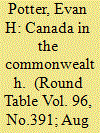

|
|
|
|
|
| Publication |
2007.
|
| Summary/Abstract |
Canada has long been a major player in the Commonwealth. This essay will assert that Canada has the ability and opportunity to redefine its place in this organization and assume a greater leadership role. Reviewing Canada's involvement within the official and unofficial institutions of the Commonwealth is the basis for an examination of the role played by this multilateral organization in Canada's foreign policy. A discussion of the costs and benefits of Commonwealth membership generates some recommendations. Given Canada's pursuit of an avowedly stronger international presence since 2003, the perception that it has been a model nation in managing a diverse society, and its active role in responding to failed and fragile states (especially in Haiti and Afghanistan), there is an opportunity for Canada to seek an even greater leadership role within the Commonwealth, although to be successful this expression must be backed by the necessary domestic public support that can be translated into political will.
|
|
|
|
|
|
|
|
|
|
|
|
|
|
|
|
| 2 |
ID:
079675
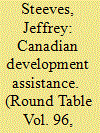

|
|
|
|
|
| Publication |
2007.
|
| Summary/Abstract |
A high degree of consonance exists between officials designing Canadian foreign aid and the political elites of African countries. Both share a commitment to Official Development Assistance and both articulate the identical basket of values underlying current aid policies. These shared values, however, lack resonance once one moves closer to the ground within the current African condition. Drawing on field research in the East African country of Kenya, the distance between the value rhetoric of officials/leadership and the actual situation is addressed. The distance is so great as to undermine the credibility of both aid policies and of those who propagate them.
|
|
|
|
|
|
|
|
|
|
|
|
|
|
|
|
| 3 |
ID:
079674


|
|
|
|
|
| Publication |
2007.
|
| Summary/Abstract |
Responding to British complaints in 1987 of excessive focus on human rights violations in South Africa, four professional associations launched a massive survey of human rights throughout the Commonwealth. Dismayed by inadequacies in the Harare Declaration, the CHRI became a formal non-governmental institution and published a searching study of rights violations in different contexts ahead of each Commonwealth summit. Its headquarters rotated in 1993 to Delhi from where a worldwide program to increase freedom of information and press for reform of police and prison systems, as the basis for securing other human rights, has made impressive headway. The article also describes its impact on the Commonwealth Secretariat's work and its involvement with the Commonwealth Ministerial Action Group
|
|
|
|
|
|
|
|
|
|
|
|
|
|
|
|
| 4 |
ID:
079671
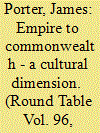

|
|
|
|
|
| Publication |
2007.
|
| Summary/Abstract |
This article reviews the contribution of the Imperial Institute and the Commonwealth Institute to the cultural understanding of the Empire and Commonwealth. It traces the shift in the focus of the Imperial Institute from the triumphal display of the British Empire at the end of the 19th century to the gradual portrayal of the life of individual countries in the first part of the 20th century. A new Commonwealth emerged from the struggle of the colonies for freedom and democracy. As a result, the Commonwealth Institute replaced the Imperial Institute in 1962. Although funded by the British government, it became closely associated with the aspirations of the newly independent Commonwealth nations and became a major centre for them to share their new cultural dynamism. In 2004 the Trustees decided to fund a Centre for Commonwealth research and training in the University of Cambridge. As a result the Institute building closed and its future use remains uncertain.
|
|
|
|
|
|
|
|
|
|
|
|
|
|
|
|
| 5 |
ID:
079669
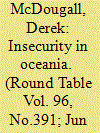

|
|
|
|
|
| Publication |
2007.
|
| Summary/Abstract |
During the Cold War security concerns in Oceania were predominantly state-centred, involving such issues as 'strategic denial' in relation to the USSR, French nuclear testing and the Kanak demand for independence in New Caledonia. In the post-cold war era 'comprehensive security' provides a useful framework for assessing security in Oceania. This framework covers various issues, including political and societal security (particularly failing states), economic security, environmental security and various new international agenda issues (such as organized crime, terrorism and health). 'Enhanced regionalism' has been an important response to these various challenges. Australia has assumed a leading role in the development of this response, and also led the international intervention in Solomon Islands in 2003. Stronger regional cooperation is likely to result from the Pacific Plan, although not to the extent sought by Australia. The response to insecurity in Oceania needs to focus on long-term development issues.
|
|
|
|
|
|
|
|
|
|
|
|
|
|
|
|
| 6 |
ID:
079670
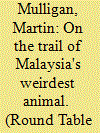

|
|
|
|
|
| Publication |
2007.
|
| Summary/Abstract |
The rainforests and mangrove wetlands of Malaysia and Southeast Asia are among Earth's most naturally rich environments; temperate countries are poor by comparison. A high proportion of animals and plants in these tropical rainforests, the outcome of 60 million years of evolution, live nowhere else. So the importance of work to conserve this region is apparent. Yet much of this work is left to the so-called GONGOS - or government-owned non-governmental organizations. The GONGO is a species of organization that is found world-wide wherever democracy is new or fragile or otherwise less than fully functioning. Despite frustrations and constraints, however, tiny groups of idealists within this framework may influence and even transform government policy
|
|
|
|
|
|
|
|
|
|
|
|
|
|
|
|
| 7 |
ID:
079673


|
|
|
|
|
| Publication |
2007.
|
| Summary/Abstract |
In the wake of deteriorating relations between the government of Hugo Chavez in Venezuela and the administration of George W. Bush in the USA, Venezuela has sought to expand its influence into Commonwealth Caribbean countries by offering a loan scheme for oil payments. Caricom countries account for almost half the votes in the Organization of American states and the Latin American and Caribbean Group in UN bodies. President Chavez has called on the Caribbean to join a 'sea of resistance' against US imperialism as part of his programme of 21st century socialism and rejection of the US initiative for a Free Trade Area of the Americas. The USA had written to Caricom countries warning them against a relationship with Chavez and accusing him of threatening democracy. This article analyses the traditional relationship between Caricom and the USA, on the one hand, and the new relationship with Venezuela, on the other, and argues that the Caricom countries, small though they are, will act in their own interests
|
|
|
|
|
|
|
|
|
|
|
|
|
|
|
|